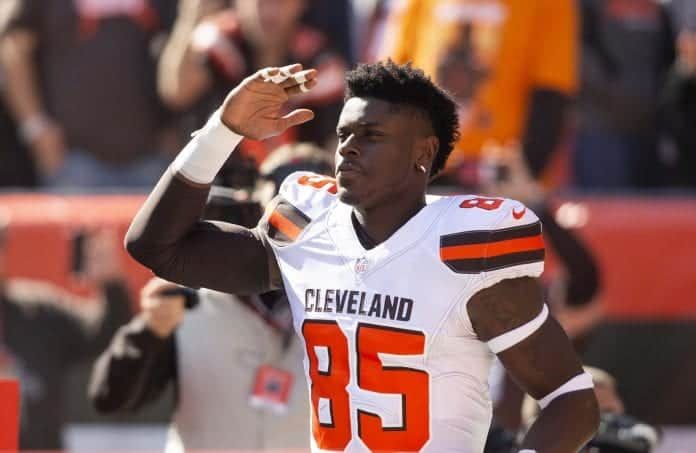Last Friday, tight end David Njoku requested that Cleveland Browns trade him to another team. Evidently, he clashed with previous head coach Freddie Kitchens, although the issues he had that carried over to the current regime is unknown. Regardless of the specific details, the Browns seem intent on keeping Njoku around.
As such, it seems worth asking how much value the fourth-year tight end actually has to their offense. After all, a new coaching staff needs its players to buy into their system. If Njoku refuses to cooperate, the team might be better off letting him go. However, a deeper analysis of Njoku’s statistics tells us that Cleveland should do their best to keep him.
A look at Njoku’s time in the NFL so far
Njoku has had an up-and-down career. His rookie season was relatively unassuming, with just 32 catches for 386 yards and four touchdowns. For a first-round pick, that might seem somewhat underwhelming, but given that Njoku was only 20 years old when he was drafted, the hope was that he would improve as he continued to develop.
That seemed to happen during his sophomore season. He improved significantly in most areas, catching 56 passes for 639 yards and four touchdowns, and appeared to be on the verge of becoming one of the NFL’s elite tight ends.
Related | Using Irv Smith Jr. to predict role of Cleveland Browns TE Harrison Bryant in 2020
Last season, however, Njoku suffered a series of setbacks. He injured his wrist in Week 2, which forced him to miss 10 games. And even after he returned, the coaching staff chose to limit his playing time. As such, he only caught five passes in total for 41 yards and one touchdown.
It was a rough year all around for Njoku, and for the Browns organization overall. It’s hardly surprising that those difficulties caused a rift between the two. But Njoku’s dramatic improvement during his first two seasons makes it just as unsurprising that Cleveland would want to avoid trading him.
Njoku’s OSM grades further illustrate his development
PFN’s Offensive Share Metric (OSM) measures how responsible a player was for their statistics, and helps us evaluate how efficient they were within their offense. In Njoku’s case, the OSM shows that not only did his statistics improve from 2017 to 2018, he was also a far more valuable player during his second season.
His OSM grade in 2017 was relatively low for a tight end; at 29.23, it ranked 30th in the NFL at the position. In 2018, it improved to 35.03, an increase of almost six points, making him the 18th highest graded tight end in the NFL. That represents a massive increase in Njoku’s efficiency, meaning that he was a far more valuable player to the team, and resulting in the overall increase in his statistics.
Explaining Njoku’s increased OSM grade
OSM grades are calculated by taking into account many of the NFL’s advanced metrics. In that respect, very little changed for Njoku from 2017 to 2018. The amount of separation he created between himself and defenders stayed roughly the same, as did his average yards after the catch.
Related | Cleveland Browns Film Room: Baker Mayfield is ready to bounce back in 2020
However, he did see a dramatic improvement in one area: his catch percentage. In 2017, Njoku only caught 53.33% of his passes. That is an astounding display of inefficiency, especially for a tight end; only players at the position caught a lower percentage.
But in the season that followed, Njoku saw a dramatic increase to 63.64%. That increase coincided with the arrival of Baker Mayfield, so perhaps Njoku’s connection with him led to increased success. Regardless of the reason, however, Njoku took a significant step in the right direction in that department in 2018.
Examining the limited information we have from 2019
The only week during the 2019 season in which Njoku played enough to earn a grade was Week 1. The grade was decent, at 34.71, ranking 15th among tight ends who qualified for grades that week. Unfortunately, it is impossible to project how the rest of Njoku’s 2019 would have gone based solely on that grade.
Maybe it would have been his best of the season, or perhaps it would have been his worst. Thanks to circumstances outside of Njoku’s control, we’ll never know the truth. However, the grade does seem to be on pace to at least match his performance from 2018, if not improve it further.
Trading Njoku would be a huge mistake
Njoku was clearly on an upward trend going into 2019. All of his statistics point in that direction. Injuries and bad blood derailed his season, but that doesn’t change how much potential he has. It was important to remember that, despite being three seasons into his NFL career, Njoku is only 23 and can continue to grow.
It is his capacity for continued development that really makes trading Njoku a worst-case scenario for Cleveland. He was already a better than average tight end in 2018. If he continues to improve at the same rate as he did during his first two seasons, he could quickly become one of the NFL’s best players at the position.
I don’t know exactly why Njoku has demanded a trade, so I can’t tell you whether or not it is a reasonable decision on his part. But the Browns should do everything they can to keep him. Given their recent struggles, they can ill-afford to trade a player of Njoku’s talents away. Hopefully, he doesn’t force them to.

